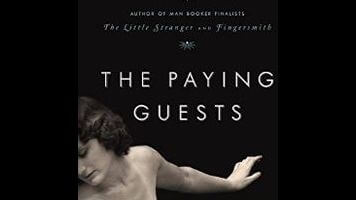Sarah Waters muses on class and identity in The Paying Guests

If one thing sets the historical fiction of Sarah Waters apart from so many novels, it’s the sense of place her prose evokes. Elegiac without being nostalgic, honest without being overly sentimental; Waters has time and again proven that she has a literary sensibility attuned to retroactively exploring the realities, faults, ideals, and hypocrisies of previous eras. In particular, 2009’s The Little Stranger used the gothic ghost story to comment on fading social status and financial insecurity in post-WWII England. Her latest novel, The Paying Guests, mines similar territory, but with even more rhetorical confidence and precision.
The novel follows twentysomething Frances and her mother, Mrs. Wray, who, since the end of WWI—which claimed the lives of Frances’ two brothers and subsequently her father, due to heartbreak—have found it increasingly difficult to retain the upper-class life they’ve built for themselves in the affluent neighborhood of Champion Hill. The house, now empty of servants, is filled with compromise; or in the words of Frances, “little economies”—which means no sweet biscuits as a dessert and limited use of oil for heat and light. In order to help pay the bills and keep up the house, Frances and her mother rent out the top floor of their home. Married couple Lilian and Leonard Barber are thus the paying guests, their arrival signaling a shift in social dynamics not only in London, but also in the lives of the Wrays. When the Barbers first arrive, it’s as if their very movements are typical of their lower-class status—luggage moved about with reckless abandon, hideous ashtrays making an appearance, and gramophones projecting chaotic music.
Initially, The Paying Guests is a lively and somewhat farcical look at class division; it’s hard not to chuckle at the haughty sensibilities of the Wrays and sympathize with the more proletarian Barber family. But soon, the novel shifts its focus, and rather than spotlight how class defines a person, instead looks at the search for identity in times of social upheaval and unsteadiness. First, we learn of Frances’ homosexuality and a youth spent protesting the war, which lead to a meaningful romance with another young protester named Christina; the reverberations of that relationship then colors every decision Frances makes throughout the novel. Then, we learn of the unhappy and rushed marriage of the Barbers. Before long, Frances and Lilian are exploring a physical and emotional bond, The Paying Guests delicately balancing erotic, melodramatic fiction with post-war realism.
The Paying Guests isn’t simply a novel of forbidden romance (though it could have been), and Lilian and Frances are not straightforward heroines for which the reader will readily cheer, embracing their quest for open, accepted love. Instead, Waters presents her female protagonists as complicated, confused, and sometimes selfish individuals. And as their romance grows, so to does its effect on the people around them. In that way, The Paying Guests is a beautiful and turbulent novel about the complexity, and often futility, of personal and social change. Frances and Lilian are searching for who they are, while the Wrays try desperately to cling to their social status. Returning soldiers, revered during wartime and showered with praise, are now reduced to jobless, homeless civilians. Even Frances’ father is wrapped up in the Wrays’ (and the country’s) frutiless search for integrity, his expensive Victorian furniture all appraised as worthless knock-offs after his death. Ultimately, Frances and her mother rely on Victorian sensibilities—organization, tidiness, and predictability—that prove useless and dated. The novel suggests that the routines and ideologies that we create for ourselves often fail us, but they also push us to reevaluate our beliefs and how we engage with the world around us. Thus, with The Paying Guests, Waters has not only crafted a vivid portrait of class dissolution in post-WWI London, but also a look at the achingly human need for a sense of purpose and, if we’re lucky, a little intimacy.